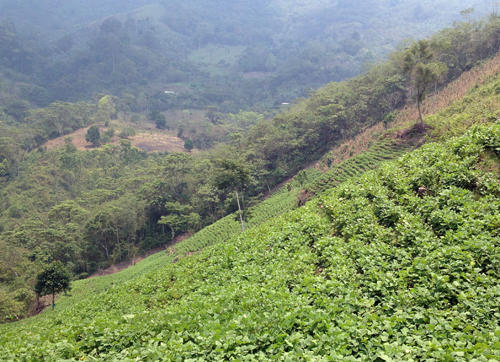Press and News USAID partners with Bioversity International on Crowdsourced Crop Improvement

Bioversity International has been awarded $1 million by the Development Innovation Ventures (DIV) program at USAID for crowdsourced crop improvement to combat climate change for smallholder farmers in Central America.
Bioversity International has been awarded $1 million by the Development Innovation Ventures (DIV) program at the U.S. Agency for International Development (USAID) to crowdsource crop improvement to combat climate change for smallholder farmers in Central America.
Growing improved varieties of crops is one way for smallholder farmers to cope with the increasing effects of climate change. But many farmers do not adopt better varieties because they lack knowledge about which varieties to take up. Maintaining the same varieties year to year is the riskiest behaviour a smallholder farmer can adopt.
However, current approaches such as participatory variety selection (PVS), in which farmers get directly involved in testing varieties and involves planting on-farm trials that farmers regular visit, is a relatively expensive approach that is not easy to scale.
Crowdsourced Crop Improvement (CCI)
Bioversity International and our partners – CATIE, Zamorano, and Virginia Tech – are piloting Crowdsourced Crop Improvement (CCI) as an alternative to PVS in several countries in Central America: El Salvador, Guatemala, Honduras and Nicaragua. Bioversity International estimates that CCI will be 43-78% more cost-effective than PVS and easier to scale to include thousands and eventually millions of farmers.
CCI builds on the same concepts that developed PVS, but is able to involve more farmers by reducing the scientific supervision needed, travel costs, and the number of varieties that each individual farmer evaluates (although together farmers evaluate just as many varieties).
After researchers select a diverse set of varieties, farmers receive a different combination of three varieties for planting. The farmers rank the varieties across their most important characteristics, and report their observations by mobile telephone.
CCI allows farmers to compare the test varieties with their traditional varieties on their own plots throughout the growing season and then report observations and receive information from researchers in real-time. Researchers will set up inexpensive weather sensors in farmers’ fields to record temperature and humidity, which combined with farmers' feedback will help to better evaluate crop traits related to climate adaptation.
Over the past two years, CCI pilots in India, Ethiopia and Honduras have shown that this approach produces robust comparative data, enables farmers to observe crops more consistently, and increases the number of farmers that can participate without increasing the cost.
Eventually, Bioversity International plans to expand CCI through service contracts to certified providers that can use the approach independently, as well as involve local governments in validating seed varieties. Bioversity International aims to scale this project throughout Central America, with the potential to reach 2 million grain-producing households.
Crowdsourced Crop Improvement is a component of the ‘Seeds for Needs’ initiative and the CGIAR Research Program on Climate Change, Agriculture and Food Security.
About Bioversity International
Bioversity International is a global research-for-development organization. We have a vision – that agricultural biodiversity nourishes people and sustains the planet.
We deliver scientific evidence, management practices and policy options to use and safeguard agricultural and tree biodiversity to attain sustainable global food and nutrition security. We work with partners in low-income countries in different regions where agricultural and tree biodiversity can contribute to improved nutrition, resilience, productivity and climate change adaptation.
Bioversity International is a member of the CGIAR Consortium – a global research partnership for a food-secure future.
About Development Innovation Ventures:
USAID’s Development Innovation Ventures (DIV) is an investment platform that finds, tests, and scales new solutions to development challenges around the world. Through a year-round open competition for ideas, DIV seeks ideas that demonstrate cost-effectiveness relative to traditional approaches that gather rigorous evidence of their intervention’s impacts, and that have the potential to scale through the public or private sector without long-term DIV support. For further information about DIV, please visit http://www.usaid.gov/div
